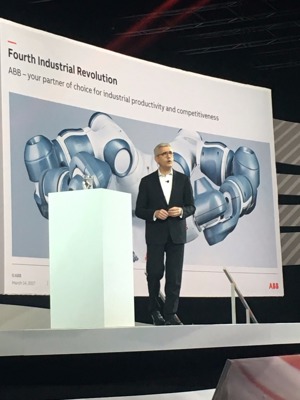ABB Customer World: Preparing for the digital revolution
HOUSTON -- Collaboration and connectivity is key within the digital revolution ABB CEO Ulrich Spiesshofer said during the welcome keynote address Tuesday morning at ABB Customer World in Houston.

“It’s impossible,” Spiesshofer said. “I would have said in 2005 when I joined this wonderful company if people would have told me in the year 2016 there will be seven billion devices in industry connected to the industrial internet. And this number will go up by 2020 to more than 25 billion connected devices.”
ABB is leading the way in this revolution, Spiesshofer said, with the company’s smart sensor, a solution put on about 300 million electric motors in industries with the ability of better uptime, higher speed and better yield of industrial processes.
“Downtime could be reduced by up to 70% of the operating motor,” Spiesshofer said. “Lifetime expectancy can be increased by 40% and the energy consumption could be cut about 10%.”
The smart sensor technology is being used today, Spiesshofer said, to give the company’s robots completely new purposes and self-learning capability. To demonstrate the artificial intelligence, Spiesshofer explained, ABB has brought YuMi, a dual-arm, small parts assembly robot with the capability of solving a Rubik’s Cube in less than two minutes by analyzing and learning how to combine the logical movement of the pieces and the mechanical moving of the cube in the right direction.
ENTREPRENEURIAL BUSINESSES
Whether through the training, or the shape of how ABB has outlaid their businesses today, Spiesshofer said, ABB has been transformed in a significant way.
“All four of our businesses today are No. 1 or No. 2 in their respective markets,” Spiesshofer said. “Each of them have clearly defined markets and a clearly defined set of competitors.”
Electrification products. ABB is No. 2 in this market, which covers the electrification of all consumption points, from households to industrial uses with a market size of $140 B and growth of 2-4%.
Robotics and motion. This market focuses on robotics and intelligent motion solutions, which is a field that ABB has sharpened in the most recent years, Spiesshofer said, with a dramatic turnaround in the robotics field in the last couple of years, rising to No. 2 in the robotics field, while settling at the top of the motion field.
Industrial Automation. Process control is an important market for the company, Spiesshofer said, and a market ABB is prepared to handle. With ABB’s Distributed Control systems and Integrated Operations systems, the company is well positioned, Spiesshofer said, to work with customers in this market.
Power grids. Automating and relying more on digitization, power grids are an important market, Spiesshofer said. ABB is working to create a stronger, smarter and greener grid to stay No. 1 in transmission and distribution.
“We want to be the partner of choice in the fields where we are active, and we will not rest, coming out with new technologies, and making sure we serve you well every day, wherever you are,” Spiesshofer said.
FOURTH INDUSTRIAL REVOLUTION
The first three industrial revolutions that happened throughout history were about replacing muscle power in factories with machines, Spiesshofer said. Unlike its predecessors, the fourth industrial revolution is about replacing brain work with artificial intelligence, processing capability, computing power and digital solutions.
And unlike previous industrial revolutions, Spiesshofer explained, this fourth revolution is leaving the factory to work, allowing the technology to go everywhere, working in any process, in any enterprise.
“The reach and scope is much wider than previous industrial revolutions,” Spiesshofer said.
As the technology evolves, industries must remember to advance the people with the technology, Spiesshofer said. Besides the scope and reach of the revolution, is the unprecedented speed of change. Where before, advancement was made with each new generation, Spiesshofer explained, technology is advancing at such a rate that it is happening within the same generation.
“There is a lot of nervousness with the speed of job changes coming, Spiesshofer said. “But be rest assured about one thing, every industrial revolution so far has changed jobs, but the amount of work in the world has gone up. And this fourth revolution will create additional work. And it is our job through investing in education, to take the people with us.”
The way to be competitive globally in this fourth industrial revolution, Spiesshofer said, is to intelligently combine human work with robotization.
DIGITAL OPPORTUNITES
With the rapid rate of growth, there are significant digital opportunities for ABB’s customers, Spiesshofer said. On the digital S-Curve, industries such as oil and gas, chemicals, transportation and utilities fall on the bottom of the curve, which allows for a possible $1 trillion cost advantage to those industries.
To “win” in digital, Spiesshofer explained, is to master the control room, integrating all digital solutions. ABB Ability solutions digitally connects products and services with the company’s expertise, allowing for a quantum leap in asset effectiveness, Spiesshofer said, creating competitiveness and productivity for all ABB customers.







Comments